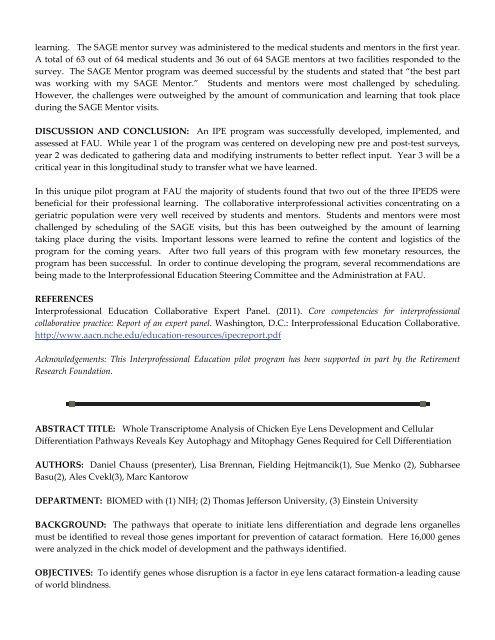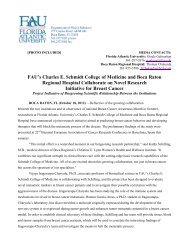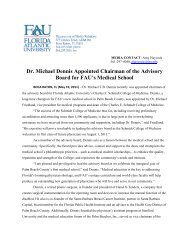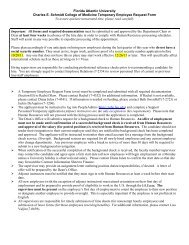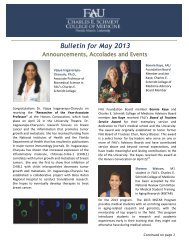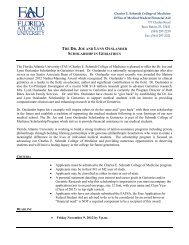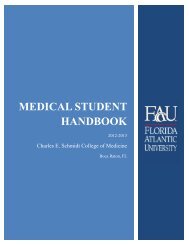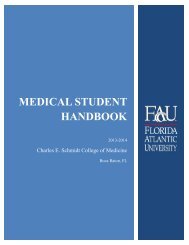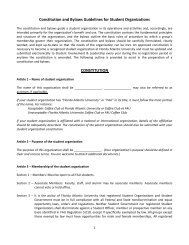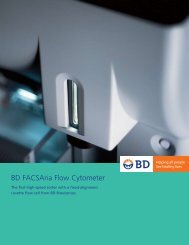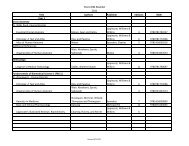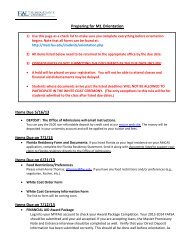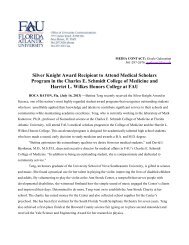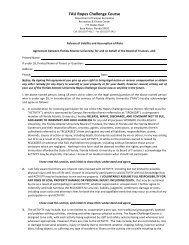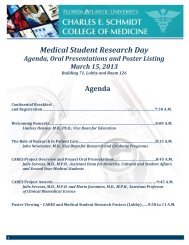Research Day Book 2013 - College of Medicine - Florida Atlantic ...
Research Day Book 2013 - College of Medicine - Florida Atlantic ...
Research Day Book 2013 - College of Medicine - Florida Atlantic ...
Create successful ePaper yourself
Turn your PDF publications into a flip-book with our unique Google optimized e-Paper software.
learning. The SAGE mentor survey was administered to the medical students and mentors in the first year.<br />
A total <strong>of</strong> 63 out <strong>of</strong> 64 medical students and 36 out <strong>of</strong> 64 SAGE mentors at two facilities responded to the<br />
survey. The SAGE Mentor program was deemed successful by the students and stated that “the best part<br />
was working with my SAGE Mentor.” Students and mentors were most challenged by scheduling.<br />
However, the challenges were outweighed by the amount <strong>of</strong> communication and learning that took place<br />
during the SAGE Mentor visits.<br />
DISCUSSION AND CONCLUSION: An IPE program was successfully developed, implemented, and<br />
assessed at FAU. While year 1 <strong>of</strong> the program was centered on developing new pre and post‐test surveys,<br />
year 2 was dedicated to gathering data and modifying instruments to better reflect input. Year 3 will be a<br />
critical year in this longitudinal study to transfer what we have learned.<br />
In this unique pilot program at FAU the majority <strong>of</strong> students found that two out <strong>of</strong> the three IPEDS were<br />
beneficial for their pr<strong>of</strong>essional learning. The collaborative interpr<strong>of</strong>essional activities concentrating on a<br />
geriatric population were very well received by students and mentors. Students and mentors were most<br />
challenged by scheduling <strong>of</strong> the SAGE visits, but this has been outweighed by the amount <strong>of</strong> learning<br />
taking place during the visits. Important lessons were learned to refine the content and logistics <strong>of</strong> the<br />
program for the coming years. After two full years <strong>of</strong> this program with few monetary resources, the<br />
program has been successful. In order to continue developing the program, several recommendations are<br />
being made to the Interpr<strong>of</strong>essional Education Steering Committee and the Administration at FAU.<br />
REFERENCES<br />
Interpr<strong>of</strong>essional Education Collaborative Expert Panel. (2011). Core competencies for interpr<strong>of</strong>essional<br />
collaborative practice: Report <strong>of</strong> an expert panel. Washington, D.C.: Interpr<strong>of</strong>essional Education Collaborative.<br />
http://www.aacn.nche.edu/education‐resources/ipecreport.pdf<br />
Acknowledgements: This Interpr<strong>of</strong>essional Education pilot program has been supported in part by the Retirement<br />
<strong>Research</strong> Foundation.<br />
ABSTRACT TITLE: Whole Transcriptome Analysis <strong>of</strong> Chicken Eye Lens Development and Cellular<br />
Differentiation Pathways Reveals Key Autophagy and Mitophagy Genes Required for Cell Differentiation<br />
AUTHORS: Daniel Chauss (presenter), Lisa Brennan, Fielding Hejtmancik(1), Sue Menko (2), Subharsee<br />
Basu(2), Ales Cvekl(3), Marc Kantorow<br />
DEPARTMENT: BIOMED with (1) NIH; (2) Thomas Jefferson University, (3) Einstein University<br />
BACKGROUND: The pathways that operate to initiate lens differentiation and degrade lens organelles<br />
must be identified to reveal those genes important for prevention <strong>of</strong> cataract formation. Here 16,000 genes<br />
were analyzed in the chick model <strong>of</strong> development and the pathways identified.<br />
OBJECTIVES: To identify genes whose disruption is a factor in eye lens cataract formation‐a leading cause<br />
<strong>of</strong> world blindness.


